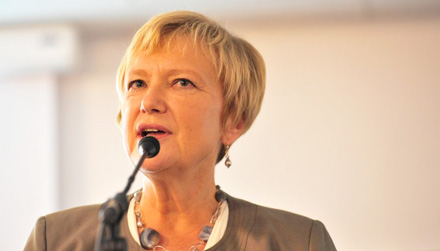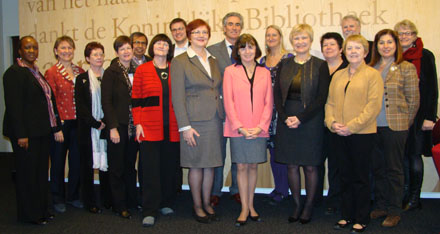IFLA Presidential Newsletter December 2011
21 December 2011
 Dear IFLA colleagues
Dear IFLA colleagues
It is quite incredible that already four months have passed since I became IFLA President at the WLIC in Puerto Rico in August. Time has gone by very quickly as I have visited several countries representing IFLA. Two aspects have stood out for me during my travels. One is that young people want to become more involved in IFLA. Not only does IFLA have a very active New Professionals Special Interest Group (NPSIG), but we have increasing student membership. They have a lot of interest in world events and they want to know how they can become more engaged in information and digital activities. The other message I am hearing is that IFLA should expand its multilingual capacity to serve its members in our official languages. Our key initiative for 2012 to develop IFLA’s multilingualism will help to do just that.
I know that IFLA members work very hard and achieve so much that I’m very proud to be representing you all. I hope in my newsletter to give you a summary of some of the highlights from the last four months.
- Positive steps forward at WIPO SCCR
- Speaking invitations
- IFLA Governing Board week
- UNESCO endorsement
- My first Presidential Meeting, 12 – 14 April 2012
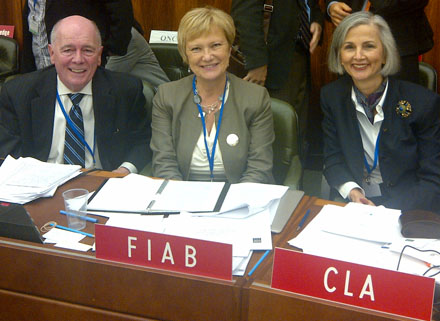
Head of Delegation, Winston Tabb, IFLA President Ingrid Parent, CLM Chair Victoria Owen
Positive steps forward at WIPO SCCR
The 23rd session of the World Intellectual Property Organisation’s Standing Committee on Copyright and Related Rights (WIPO SCCR/23) ended on 2nd December 2011 and I was in Geneva to share in the good news that the SCCR/24 will take forward the discussion about creating a legal instrument on exceptions and limitations for Libraries and Archives.
IFLA has been working alongside other library and archive bodies to advocate for an international treaty so that WIPO Member States establish a set of basic, minimum limitations and exceptions for the benefit of libraries, archives, and their users in their national copyright laws. For the first time, the WIPO SCCR, the main body that shapes international copyright law, dedicated three extra days to discussion of limitations and exceptions for libraries and archives.
We feel that real progress was made during the SCCR and we hope it will lead to an international solution to benefit libraries and archives, and their users, everywhere. The way WIPO Member States have engaged with library and archives issues has been very encouraging indeed.
I’m very proud of what IFLA has done to get us to this point and I’m confident that we will be able to put in the effort needed to make sure that our voice continues to be heard and that we can have a positive outcome.
Speaking invitations
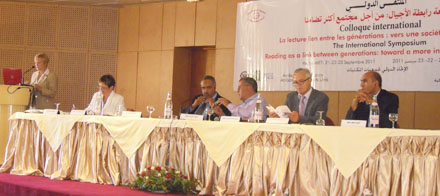
I have had the pleasure to be invited by a number of IFLA members and associations from different parts of the world to speak at their events in the last quarter and I would like to thank my hosts in each of these countries for the wonderful and enriching time that I spent with them.
In Hamammet, Tunisia, in September I was the keynote speaker with a talk entitled "Towards an inclusive society: how libraries bridge generations" which was to fit into the theme of the event "Reading is a link between generations: toward a more interdependent society". The symposium welcomed participants from Africa, Europe, North America, Asia and the Middle East and resulted in a declaration, available on the IFLA Literacy and Reading section’s website. The results of our discussions will also feed into the section’s programme at the IFLA World Library and Information Congress 2012 in Helsinki.
In October I was in Maribor, Slovenia, for the Biannual Conference of the Slovenian Library Association: "Library: Open Space for Dialogue and Knowledge" where I was a plenary speaker on my Presidential theme "Libraries – a force for change", speaking about the changing role of the librarian and the special power that libraries have to make a difference in peoples’ lives. I also had the pleasure of visiting several libraries in Maribor and in Ljubljana and was very impressed with the range of innovative services offered to their users.
A week later found me in the Caribbean for the conference of the Library Association of Barbados where I met a small but dedicated group of librarians and information professionals. I spoke to them about the fact that "No Library is an Island", that we find strength in working together in our various associations to improve our services. I also visited a wonderful collection on cricket at the University of the West Indies.
Closer to home, I participated in a session on IFLA at the Congrès des milieux documentaires du Québec. I was joined by two active IFLA members, Suzanne Payette and Claude Bonnelly, to outline the special role that IFLA as an international association plays in supporting public and university libraries. This annual conference groups together several library, archival and other information associations into one major event that attracts over a thousand participants.
And just recently I had the privilege of participating in of the National Library of Spain’s 300th anniversary in Madrid.
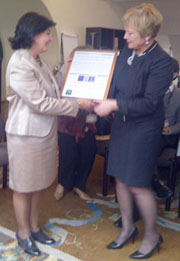
Gloria Pérez-Salmerón receiving a certificate from IFLA, commemorating the 300th anniversary of the Spanish National Library
The opening of its fantastic exhibit on December 13 kicks off a whole year of events. I had the honour to greet the King and Queen of Spain. They were very interested and impressed in the collection of the National Library, a heritage that must be protected as well as made accessible to all. Gloria Pérez-Salmerón, Director of the National Library, directed the organization of the events and did an outstanding job. The media covered the events in great detail and it raised the profile of the National Library and all libraries in Spain. Details of the events, exhibitions and concerts connected to the celebration can be found on an English language website.
While I was in Madrid I attended FESABID’s presentation of its study and report on the current situation and development of the profession of librarians and archivists in Spain. This comprehensive study surveyed around 1500 people and took 18 months to complete: there are not many studies of this scale that have been done elsewhere. The results of the survey (currently only in Spanish) have been thoroughly analyzed and FESABID and other organizations and institutions will be following up on priority action items. I had the opportunity to say a few words at the presentation on the importance of the profession as well as of professional associations (without a strong national library association, there cannot be strong libraries) and to highlight the opportunities for development and the past outcomes of IFLA’s BSLA programme.
All of these events, and upcoming events that I will be attending, are listed in IFLA’s new calendar of events, which is designed to promote IFLA’s outreach & advocacy activities, IFLA’s representation worldwide, and events supported by our Professional Units.
IFLA Governing Board week
The IFLA Governing Board (GB) and Professional Committee (PC) met at IFLA HQ in the week starting on the 5th of December. It’s a busy week for those of us involved, including HQ staff. We also split into smaller working groups during this week to make advances in our five Key Initiatives. These working groups report to the GB on such diverse topics as principles of engagement in library-related activities in times of post-conflict or natural disaster recovery, a vision report 2020 modeling the evolving digital information environment, creation of an IFLA repository, the International Leadership Development Programme, and enhancement of multilingualism within IFLA.
The GB is also in the process of approving various policies and treaties in our areas of copyright and advocacy work including: Guiding Principles on Intellectual Property and Genetic Resources, Traditional Knowledge and Folklore; a Draft IFLA statement on Legal Deposit; a Draft IFLA statement on Orphan Works; a Draft Position paper on digital lending; Guidelines on Privacy and the Use of Social Media; UNESCO/IFLA statement on Media and Information Literacy, and a Draft IFLA Code of Ethics for Librarians.
The GB accepted a proposal from the Advisory Board of ICADS (IFLA-CDNL Alliance for Digital Strategies) to cease the activities of the ICADS group, mainly because there is now a strong understanding of the potential of digital library technologies and a widespread focus on digital themes throughout the IFLA programme. IFLA and CDNL will look at new ways to work together in future (including the new Committee described below), and the ICADS member libraries remain committed to promoting digital initiatives through the work of the many sections to which they are affiliated.
A new IFLA Committee on Standards was set up by the GB with representatives from the five IFLA Divisions, the Chair of the IFLA UNIMARC Permanent Committee, a representative from CDNL, and the Chair, Patrice Landry. The Committee will officially start working from January 2012 to look at the way IFLA standards (guidelines, standards, conceptual models, etc) are managed, developed and maintained and how these could be better accessed and promoted. More information will be made available through the IFLA website as the group gets going.
The PC and GB approved the formation of three new Special Interest Groups (SIGs) and these will soon get their own section of the IFLA website through which to promote their activities to you all so if you’re interested in these topics, please go and have a look:
- RFID SIG
- Semantic Web SIG
- National Information & Library Policy SIG
UNESCO endorsement
I am delighted that UNESCO endorsed the IFLA Manifesto for Digital Libraries at its recent General Conference 2011.
The manifesto was initiated by one of my predecessors, Claudia Lux, and explains how IFLA believes that access to information resources supports education and health as much as cultural and economic development. 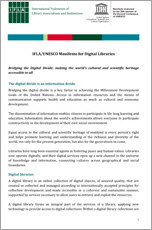 Information about the world’s achievements allows all people to participate constructively in the development of their own social environment. Equal access to cultural and scientific heritage is every person’s right and it helps promote learning and understanding of the richness and diversity of the world and its peoples, not only for the present generation, but also for the next generations. The Manifesto provides principles to assist libraries in undertaking sustainable and interoperable digitisation activities to bridge the digital divide—a key factor in achieving the Millennium Development Goals of the United Nations. Digital libraries are essential for access to information, and for preserving national heritage.
Information about the world’s achievements allows all people to participate constructively in the development of their own social environment. Equal access to cultural and scientific heritage is every person’s right and it helps promote learning and understanding of the richness and diversity of the world and its peoples, not only for the present generation, but also for the next generations. The Manifesto provides principles to assist libraries in undertaking sustainable and interoperable digitisation activities to bridge the digital divide—a key factor in achieving the Millennium Development Goals of the United Nations. Digital libraries are essential for access to information, and for preserving national heritage.
The endorsement enables IFLA members to work with UNESCO Member States within the context of national e-strategies aimed at increasing access to information and development. It provides IFLA members with a stronger foundation on which to lobby for and to implement digitisation activities.
IFLA maintains a long and lasting partnership with UNESCO notably in the areas of library cooperation, promotion of universal access to information and information preservation. As part of this co-operation IFLA will be contributing to a major conference on the preservation of digital heritage being organized by UNESCO in Canada on 26-28 September next year.
My first Presidential Meeting, 12 – 14 April 2012
I’m proud to announce that the website is ready for my upcoming Presidential meeting which will be here in Canada in April 2012 with the theme "Indigenous Knowledges: Local Priorities, Global Contexts". The website will continue to grow over the next several weeks and I’m hoping to welcome many of you to the beautiful city of Vancouver for what should be a very interesting and stimulating programme of events.
The professional programme is also soon to be announced for the next IFLA World Library and Information Congress 2012, which as you know, will take place in Helsinki in August. Many IFLA Professional Units are busy with preparations for their part of the programme, and in many cases, for their satellite meetings as well. The website is being updated almost daily with links and more information so don’t forget to keep checking for the latest news.
So with a busy year almost behind us, that just leaves me to thank you all for your continuing interest in and support for IFLA’s activities and to wish you all much success for the coming year.
IFLA le desea un buen 2012
IFLA wünscht Ihnen ein gutes 2012
IFLA vous souhaite une bonne 2012
مع أطيب الأمينات لعام 2012
国际图联祝你2012年吉祥如意!
ИФЛА желает Вам хорошего 2012 года
IFLA wishes you a good 2012
Ingrid Parent
IFLA President 2011-2013
Back to the top of this page ↑
| The Letter of the President is distributed quarterly and provides an overview of some of the current activities of the IFLA President, President-Elect, the Governing Board and IFLA Headquarters staff. It is sent to IFLA-L and other mailing lists organised by IFLA. The newsletter is sent in plain-text and so should cause no reception problems. |
